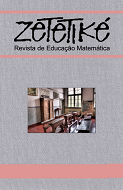Abstract
Problem posing has been considered a cognitively demanding activity, with potential for the development and evaluation of critical and creative thinking. In the classroom it is considered one of the authentic forms of mathematical investigation in which students have the possibility to associate their experiences, interests and knowledge in the creation of problems. Contributing to this research strand, this paper aims to discuss the potential of problem posing for the development of creative thinking in mathematics classes. In particular, this qualitative study aims to analyze a problem posing activity carried out with a class of first grade elementary school children. The results indicate that problem posing has significant potential for the development of creativity, allowing children to assign meaning and critically analyze data, relating their experiences, knowledge, and interests.
References
Allevato, N. S. G., & Onuchic, L. R. (2021). Ensino-Aprendizagem-Avaliação de Matemática: por que Através da Resolução de Problemas? In: L. R. Onuchic, N. S. G. Allevato, F. C. H. Noguti & A. M. Justulin. (Orgs.), Resolução de Problemas: teoria e prática. (2a. ed., pp. 40-62). Jundiaí: Paco.
Allevato, N. S. G., & Possamai, J. P. (2022). Proposição de Problemas: possibilidades e relações com o trabalho através da Resolução de Problemas. Com a Palavra, O Professor, 7(18), 153-172. https://doi.org/10.23864/cpp.v7i18.817
Amado, J., & Freire, I. (2014). Estudo de caso na investigação em Educação. In: Amado, J. (Ed.), Manual de Investigação qualitativa em educação (2ª. ed., pp. 121-144). Universidade de Coimbra.
Ayvaz, Ü., & Durmus, S. (2021). Fostering mathematical creativity with problem posing activities: an action research with gifted students. Thinking Skills and Creativity, 40, 1-17.
Bicer, A. (2021). A systematic literature review: Discipline-specific and general instructional practices fostering the mathematical creativity of students. International Journal of Education in Mathematics, Science, and Technology (IJEMST), 9(2), 252-281. https://doi.org/10.46328/ijemst.1254.
Bicer, A., Lee, Y., Perihan, C., Capraro, M. M., & Capraro, R. M. (2020). Considering mathematical creative self-efficacy with problem posing as a measure of mathematical creativity. Educational Studies in Mathematics 105, 457–485. https://doi.org/10.1007/s10649-020-09995-8.
Bonotto, C. (2013). Artifacts as sources for problem-posing activities. Educational Studies in Mathematics, 83, 37-55. https://doi.org/10.1007/s10649-012-9441-7.
Borba, M. C., Almeida, H. R. F. L. & Gracias, T. A. S. (2018). Pesquisa em ensino e sala de aula: diferentes vozes em uma investigação. Belo Horizonte, Autêntica.
Cai, J. (2022). What research says about teaching mathematics through problem posing. Éducation et Didactique, 16, 31-50. https://doi.org/10.4000/educationdidactique.10642.
Cai, J., & Hwang, S. (2020). Learning to teach through Mathematical Problem Posing: theoretical considerations, methodology, and directions for future research. international Journal of Educational Research, 102, 1-8. https://doi.org/10.1016/j.ijer.2019.01.001.
Cai, J., & Leikin, R. (2020). Affect in mathematical problem posing: conceptualization, advances, and future directions for research. Educ Stud Math, 105, 287–301. DOI: https://doi.org/10.1007/s10649-020-10008-x.
Centurión, M. R., Teixeira, J. L. S., & Rodrigues, A. B. (2019). Porta Aberta para o Mundo: Matemática 1. São Paulo, FTD.
Ellerton, N. F. (1986). Children´s made-up mathematics problems – a new perspective on talented mathematicians. Educational Studies in Mathematics, 17, 261-271.
Gontijo, C. H. (2007). Criatividade em Matemática: um olhar sob a perspectiva de sistemas. Zetetiké, 15 (28), 153-172. DOI: https://doi.org/10.20396/zet.v15i28.8647029.
Gontijo, C. H., Carvalho, A. T., Fonseca, M. G., & Farias, M. P. (2019). Criatividade em Matemática: conceitos, metodologia e avaliação. Brasília: Editora Universidade de Brasília.
González, F. E. (1998). Metacognicion y tareas intelectualmente exigentes: el caso de la resolución de problemas matemáticos. Zetetiké, 6 (9), 59-73.
Haavold, P., Sriraman, B., Lee, KH. (2020). Creativity in Mathematics Education. In: Lerman, S. (eds) Encyclopedia of Mathematics Education. Springer, Cham. https://doi.org/10.1007/978-3-030-15789-0_33.
Jesus, C. C. de, Cyrino, M. C. de C. T., & Oliveira, H. (2018). Análise de tarefas cognitivamente desafiadoras em um processo de formação de professores de Matemática. Educação Matemática Pesquisa, 20(2), 21–46. https://doi.org/10.23925/1983-3156.2018v20i2p21-46
Joklitschke, J., Baumanns, L., & Rott, B. (2019). The intersection of problem posing and creativity: a review. Proceedings of 11th International MCG Conference, (pp. 59-67). Hamburg, Germany. Retirado em 11 de dezembro, 2022, de: https://mathedidaktik.uni-koeln.de/fileadmin/home/baumanns/MCG2019_Joklitschke-Baumanns-Rott.pdf
Kauark, F. S., Manhães, F. C. & Medeiros, C. H. (2010). Metodologia da Pesquisa: Um guia prático. Itabuna: Via Litterarum.
King, F. J., Goodson, L., & Rohani, F. (2008). Higher Order Thinking Skills. Center for Advancement of Learning and Assessment.
Lester, F. & Cai, J. (2016). Can Mathematical Problem Solving Be Taught? Preliminary Answers from 30 Years of Research. In: P. Felmer, E. Pehkonen & J. Kilpatrick. Posing and Solving Mathematical Problems: Advances and New Perspectives. New York, Springer, 117-135.
Ministério da Educação. (2018). Base nacional comum curricular. Brasília: MEC/SEB, versão completa.
NCTM. (2000). Principles and Standards for School Mathematics. Reston, VA: National Council of Teachers of Mathematics.
Possamai, J. P., & Allevato, N. S. G. (2022). Elaboração/Formulação/Proposição de Problemas em Matemática: percepções a partir de pesquisas envolvendo práticas de ensino. Educação Matemática Debate, 6(12), 1-28. https://doi.org/10.46551/emd.v6n12a01.
Possamai, J. P., Allevato, N. S. G., & Strelow, S. B. (2023). Proposição de problemas nos anos iniciais: reflexões sobre elementos disparadores e prompt. Revista Paranaense de Educação Matemática, 12(27), 139–157. https://doi.org/10.33871/22385800.2023.12.27.139-157.
Silver, E. A. (1994). Fostering creativity through instruction rich in mathematical problem solving and problem posing. ZDM: The International Journal on Mathematics Education, 29(3), 75-80, 1994. https://doi.org/10.1007/s11858-997-0003-x.
Silver, E. A., & Cai, J. (1996). An analysis of arithmetic problem posing by middle school students. Journal for Research in Mathematics Education, 27(5), 521-539.
Stoyanova, E., & Ellerton, F. N. (1996). A Framework for Research into Students' Problem Posing in School Mathematics. Technology in Mathematics Education, Melbourne, 518-525.
Vieira, G., & Allevato, N. S. G. (2021). Resolução de problemas em Educação Matemática e o desenvolvimento de habilidades de pensamento de ordem superior. REMAT: Revista Eletrônica da Matemática, 7(especial), e4001. https://doi.org/10.35819/remat2021v7iespecialid5485.
Zhang, H., & Cai, J. (2021). Teaching mathematics through problem posing: insights from an analysis of teaching cases. ZDM Mathematics Education, 53, 961-973.

This work is licensed under a Creative Commons Attribution-NonCommercial-NoDerivatives 4.0 International License.
Copyright (c) 2023 Zetetiké


